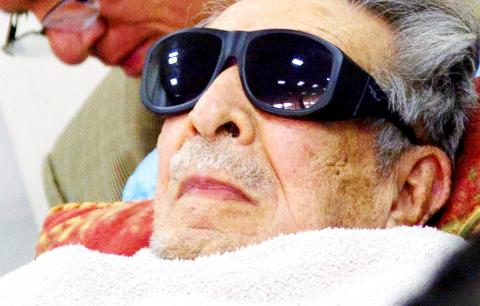Former Guatemalan president Efrain Rios Montt, who ruled the country with an iron fist in the 1980s and was accused of genocide at the peak of its long civil war, on Sunday died at the age of 91.
One of his lawyers, Luis Rosales, told reporters that Rios Montt “died in his home, with the love of his family and a clear conscience.”
However, protesting relatives of people who died under his rule splashed red paint on the sidewalk outside a former government palace in Guatemala City and on a national flag in a symbol of the blood they said he had shed, complaining that he was never punished.

Photo: AP
Rios Montt was accused of ordering the murders of 1,771 indigenous Ixil-Maya people during his short reign from 1982 to 1983, which came at the height of a brutal 36-year civil war.
According to the UN, about 200,000 people died or were made to disappear during Guatemalan Civil War, which ended in 1996.
Rios Montt was accused of orchestrating an extermination policy against the indigenous population, which was perceived to be collaborating with leftwing guerrillas waging war against government forces.
Short in stature and vigorous until recent years, Rios Montt had a humble beginning, with little to suggest a rise to national power. He was born in Guatemala’s remote Huehuetenango Province, near the border with Mexico.
He enlisted in the army as a teenager and rose through the ranks, receiving training courses at the US-run School of the Americas, where Latin American officers learned harsh tactics used in crack downs on dissidents.
Politically, Rios Montt came to the forefront in 1974 when he was put forward as a coalition presidential candidate.
Historians have said he won an overwhelming victory, but electoral fraud prevented him from taking office.
On March 23, 1982, he took power in a bloodless coup, deposing then-Guatemalan president Lucas Garcia.
During his 18-month rule, ruthless even by the standards of Latin American dictators, Rios Montt engaged in a “scorched earth” policy against dissidents, wiping out entire rural towns where leftists were suspected of living or having support.
He appointed “faceless judges” who mounted summary trials and ordered numerous alleged criminals — often leftist rebel sympathizers or militants — executed.
Rios Montt also used his office to preach to his people: Every Sunday night, dressed in a combat uniform, the dictator would take to the airwaves and talk about God, morality and politics.
He claimed in one such sermon that a “good Christian” lived their life “with a Bible and a machine gun.”
As conflicts raged in nearby Nicaragua and El Salvador, then-US president Ronald Reagan in 1982 praised Rios Montt as “a man of great personal integrity and commitment.”

Kehinde Sanni spends his days smoothing out dents and repainting scratched bumpers in a modest autobody shop in Lagos. He has never left Nigeria, yet he speaks glowingly of Burkina Faso military leader Ibrahim Traore. “Nigeria needs someone like Ibrahim Traore of Burkina Faso. He is doing well for his country,” Sanni said. His admiration is shaped by a steady stream of viral videos, memes and social media posts — many misleading or outright false — portraying Traore as a fearless reformer who defied Western powers and reclaimed his country’s dignity. The Burkinabe strongman swept into power following a coup in September 2022

‘FRAGMENTING’: British politics have for a long time been dominated by the Labor Party and the Tories, but polls suggest that Reform now poses a significant challenge Hard-right upstarts Reform UK snatched a parliamentary seat from British Prime Minister Keir Starmer’s Labor Party yesterday in local elections that dealt a blow to the UK’s two establishment parties. Reform, led by anti-immigrant firebrand Nigel Farage, won the by-election in Runcorn and Helsby in northwest England by just six votes, as it picked up gains in other localities, including one mayoralty. The group’s strong showing continues momentum it built up at last year’s general election and appears to confirm a trend that the UK is entering an era of multi-party politics. “For the movement, for the party it’s a very, very big

ENTERTAINMENT: Rio officials have a history of organizing massive concerts on Copacabana Beach, with Madonna’s show drawing about 1.6 million fans last year Lady Gaga on Saturday night gave a free concert in front of 2 million fans who poured onto Copacabana Beach in Rio de Janeiro for the biggest show of her career. “Tonight, we’re making history... Thank you for making history with me,” Lady Gaga told a screaming crowd. The Mother Monster, as she is known, started the show at about 10:10pm local time with her 2011 song Bloody Mary. Cries of joy rose from the tightly packed fans who sang and danced shoulder-to-shoulder on the vast stretch of sand. Concert organizers said 2.1 million people attended the show. Lady Gaga

SUPPORT: The Australian prime minister promised to back Kyiv against Russia’s invasion, saying: ‘That’s my government’s position. It was yesterday. It still is’ Left-leaning Australian Prime Minister Anthony Albanese yesterday basked in his landslide election win, promising a “disciplined, orderly” government to confront cost-of-living pain and tariff turmoil. People clapped as the 62-year-old and his fiancee, Jodie Haydon, who visited his old inner Sydney haunt, Cafe Italia, surrounded by a crowd of jostling photographers and journalists. Albanese’s Labor Party is on course to win at least 83 seats in the 150-member parliament, partial results showed. Opposition leader Peter Dutton’s conservative Liberal-National coalition had just 38 seats, and other parties 12. Another 17 seats were still in doubt. “We will be a disciplined, orderly